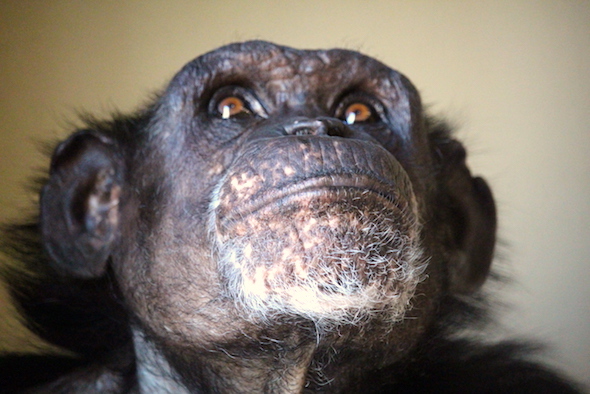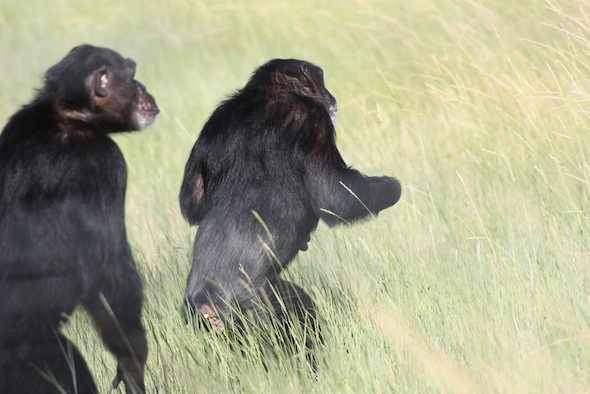Most people accept that chimpanzees are intelligent, but can they read minds? Not in a Carnac the Magnificent kind of way, but rather, do they know what other chimpanzees may or may not know? Can they take the perspective of another individual and alter their behavior accordingly? In other words, do they have what’s known as a Theory of Mind?
If you spend time around chimps you probably wouldn’t doubt for a second that they do. But one of the roles of science is to challenge our casual assumptions and force us to abandon complex explanations when simpler ones will do. For years, scientists tried to determine whether chimps were truly capable of acting on knowledge of other individuals’ mental states. They ran experiments in behavioral laboratories to try to tease out the answers. For example, would chimpanzees understand that a blindfolded researcher was incapable of telling them where food was hidden because she could not see it being hidden? The results were often inconclusive and it’s not hard to understand why. How often does someone sit blindfolded in a chair in front of you while someone else hides food around the building? What a strange thing to do. And since humans are always in cahoots anyway, who’s to say they didn’t know where the food would be before putting the blindfold on? If the chimpanzees could read minds, they’d probably wonder how we lost ours.
Field experiments offer an alternative to the more contrived situations found in the lab. Recently, a group of researchers studied how wild chimpanzees in Uganda change their alarm calls based on whether they think those around them are aware of the threat or not (read a summary here, or go here for the full article). Not surprisingly, chimps that heard a resting call from a hidden loudspeaker prior to discovering an artificial snake on a trail made a greater effort to alert those around them than when they heard alarm calls from the same speaker. They assumed that other chimps would not make resting calls if they were aware of the snake, and as a result they issued more alarm calls and stayed longer by the snake to point out the threat to those who needed to be informed.
In others words, the chimps’ responses to the sight of a snake were not simply reflexive, the way we might scream when startled. Rather, they were calculated in such a way as to ensure that critical information was given to those who needed it. From one mind to another.
I have to admit that I do wonder about the ethics of exposing wild chimpanzees to fake snakes and recorded calls, and a quick check-in with a trusted friend in the field confirmed that these experiments can have a negative impact if not done correctly. You certainly wouldn’t want to desensitize wild chimpanzees to snakes or fill them with the fear that snakes suddenly lurk around every corner.
I mention all this because a) it’s in the news, b) it’s interesting, even if you already assumed that chimps had this ability, but most importantly, c) it’s a great excuse to update our compilation of chimps reacting to snakes as CSNW:







Great post, JB!
Do chimps use different calls for different kinds of threats?
There is some evidence for this, yes, though from what I know it doesn’t seem to be as clear cut as it is in vervet monkeys, who have acoustically-distinct alarm calls for leopards, snakes, and eagles.
I still like the one of Jamie throwing the snake over the fence.
Frist, J.B. I would attend any class you teach. Sign me up! You have a gift for breaking down information making it interesting and digestible. And you always sneak in a good laugh.
Second, I am glad I did not know about all those snakes when I visited your beautiful property and walked around the outside of Young’s Hill. ???? But I now I totally understand Jamie’s wise request for everyone to wear cowboy boots, they protect your feet and ankles from snakes.
Lastly, I know chipmunks have two distinctly different alarm cries when predators are near. One sound, “chucks” (which are lower pitched, like a stick rapping a hollow wooden block) for predator in the air and “chips” (sharp, high-pitched calls) for a predator on the ground. (https://www.nwf.org/Magazines/National-Wildlife/2016/AprilMay/Animals/Chipmunks). I hear them sounding off all summer long when I walk by with my dog. These alarm calls are most definitely sounded off as a warning to others. So my question to you is, do chipmunks have Theory of Mind? I have even heard warning sounds, not a standard bark, when observing kenneled housed dogs as someone or something new is approaching. Is this the same thing as the chimps calls and actions? (And thanks for the video. Loved it.)
The key to that question is whether or not chipmunks change the way they issue alarm calls based on their beliefs about what others around them know. You can imagine many scenarios in which complex communication might evolve without theory of mind. For example, alarm calls may benefit the caller by drawing others in for protection (e.g., predator mobbing). Or, they may help perpetuate the caller’s genes by warning relatives of the potential danger. In neither of these scenarios is it necessary for the caller to know anything about what other chipmunks know (what they refer to as second-order intentionality) in order to develop a predator-defense instinct or to learn a predator-defense response. The assumption here is that it is more parsimonious to attribute the behavior to instinct or associative learning than to second-order intentionality. So it’s up to scientists to demonstrate that the “higher-level” process is at work.
If you’re feeling ambitious, you could always create a fake human out of chicken wire and plaster-of-paris and leave it near a chipmunk den, then play various chipmunk calls from your iPhone to see if the chipmunks change their calls based on what they hear 🙂
Theory of Mind, empathy in animals, and Self Recognition are topics that fascinate me. Thank you for answering my question. In my pea brain I always assume that every animal is as intelligent as a human, some just think/communicate with their noses, others with eyes, some with sound, etc. (This is why I am the art major not the Primatologist! In my next life I’ll be a creative Ethologist!)
And so you know, I am shredding newspaper right now, so by springtime, when my chippy’s return, I will have the most awesome paper mache human you have ever seen.
That’s not pea-brained! I think that’s the right place to start. The way I see it, natural selection works with what it has and it works only as well as it has to. It may lead to intelligence as we know it in some lineages, while in others a different set of abilities may be what’s required to thrive. Maybe that means something crude like producing 100x the number of offspring that will eventually survive to adulthood. Or maybe it means developing forms of social or analytical intelligence different but equally as effective as ours.
When it comes to chimpanzees, however, we should expect physiological and behavioral continuity because there is evolutionary continuity. We don’t look at a chimpanzee’s arms and suggest that they must have evolved separately from our own. So why would we expect human intelligence to spring forth out of thin air? We should expect differences, of course, given that we have evolved independently for millions of years, but the onus should be on proponents of human uniqueness to prove that we are exceptional. In most cases, they have failed, or they have retreated to fallback positions (other animals have complex communication but they lack sophisticated forms of grammar or syntax).
It’s equally problematic to assume that intelligence as we know it should arise only once. We know that wings evolved separately in birds, mammals, and insects – what we call convergent evolution. Wings are a great way to open up a new niche, so natural selection stumbled upon them repeatedly. The same should be true of complex intelligence. And in cases of convergent evolution of intelligence, we would expect that each form would differ (as do the wings of birds, bats, and insects) but they would serve the same general function. It’s in these cases where we have to be especially open-minded, because we humans are quite fond of ourselves and we like to hold ourselves up as the standard by which all others are judged.
I have always been fascinated by chimpanzees because of how similar they are to us, but it’s the octopuses that may one day be our overlords because we won’t see it coming.
There is a quote from Henry Beston that I love that I think you will too after reading this J.B. I will write it a separate reply…And, I’m with you with your observations of octopuses.
We need another wiser and perhaps a more mystical concept of animals. Remote from universal nature and living by complicated artifice, man in civilization surveys the creatures through the glass of his knowledge and sees thereby a feather magnified and the whole image in distortion. We patronize them for their incompleteness, for their tragic fate for having taken form so below ourselves. And therein do we err. For the animal shall not be measured by man. In a world older and more complete than ours, they move finished and complete, gifted with the extension of senses we have lost or never attained, living by voices we shall never hear. They are not brethren, they are not underlings. They are nations, caught with ourselves in the net of life and time, fellow prisoners of the splendor and travail of earth.
Henry Beston-The Outermost House.
Did you like the quote J.B.? Any thoughts?
Hi Chris – Thanks – yes, I do like that quote, particularly the last line. The humility with which he approached the issue is astounding, given that he wrote it almost 100 years ago and we as a society didn’t even consider other groups of humans to be equal nations (and still don’t, in many cases).
So true! I’m glad you liked it J.B. He had quite a mind for his time…
Have a lovely Thanksgiving!
Chris